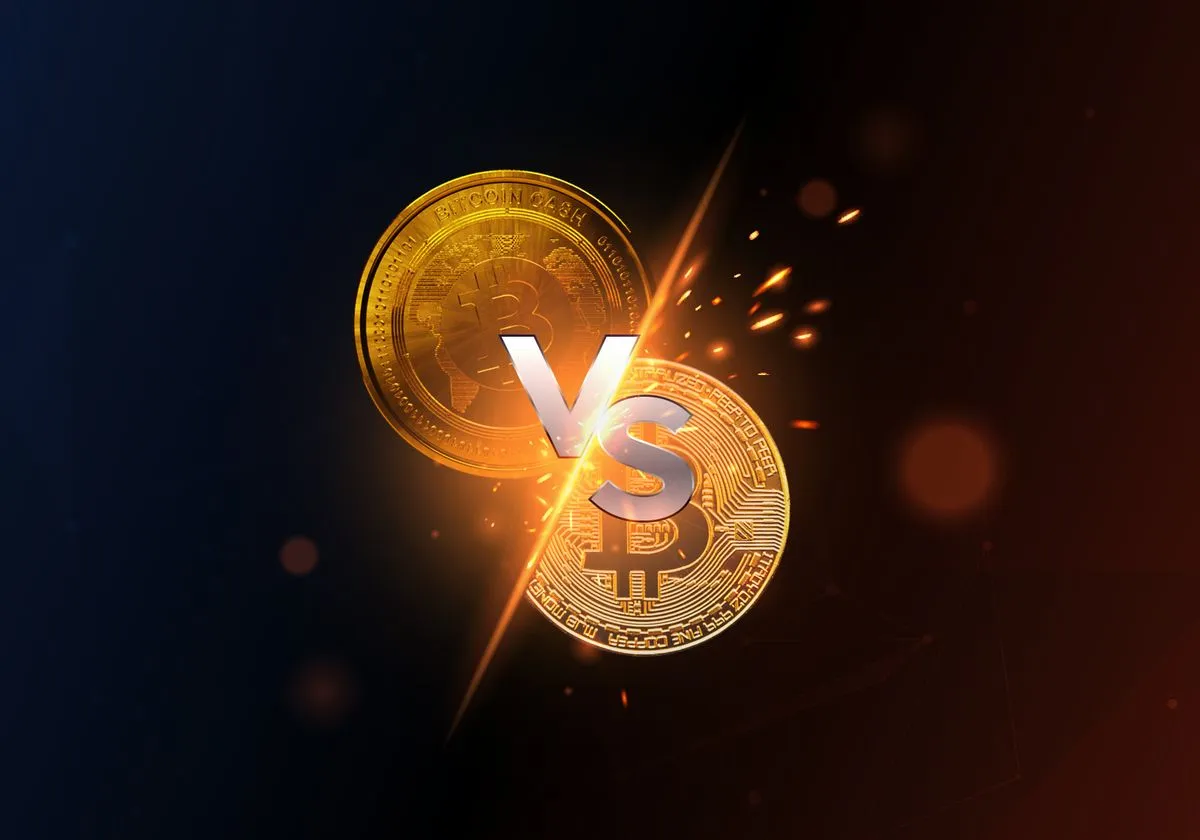
An Overview of Bitcoin vs. Bitcoin Cash
The first cryptocurrency to gain widespread recognition was Bitcoin. It started out as a payment option independent of regulatory agencies or other external parties. A Bitcoin blockchain fork, which happens when people reject changes or reprogramme a blockchain to function as they see fit, gives rise to the cryptocurrency known as Bitcoin Cash. Developers who disagreed with Bitcoin's direction led to the fork of Bitcoin Cash in 2017.
Bitcoin
Roughly 80% to 90% of Bitcoin's processing capacity was represented by mining pools and businesses in July 2017, when they decided to use segregated witness (SegWit) technology. By shifting the signature data from the block that needs to be processed for each transaction and putting it in the coinbase transaction field, this update reduced the amount of data that needs to be verified in each block.3 This was not a small technological adjustment, as it was expected that a major portion of the data processed in each block was made up of signature data.
The Bitcoin code was modified to take this development into account and also removed the restriction on Bitcoin blocks being 1MB. Block weight—which could go up to 4MB—was added to blocks.
Bitcoin Cash

The case with Bitcoin Cash is distinct. Developers and miners of Bitcoin were equally concerned about the cryptocurrency's future and scalability when they launched Bitcoin Cash. These people did not, however, share our enthusiasm for the segregated witness function. They believed that neither SegWit nor the original roadmap presented by Satoshi Nakamoto—the unidentified person who first proposed the blockchain technology underlying cryptocurrencies—addressed the core issue of scalability in a meaningful way.
A hard fork that was started in August 2017 by some miners and developers resulted in the creation of Bitcoin Cash (BCH), a new blockchain and currency. In order to speed up the verification process, BCH has a higher block size of 8 MB, which sets it apart from Bitcoin in a fundamental way. BCH also has its own blockchain and specifications. Regardless of the number of miners supporting it, transaction verification rates are guaranteed by this block size's flexible size level. In 2018, this restriction was raised to 32 MB.
As a result, wait times should be shorter and transaction processing costs may be reduced because Bitcoin Cash has the potential to execute transactions faster than the Bitcoin network. It's also thought that the Bitcoin Cash network can process a lot more transactions per second than the Bitcoin network. Though the blockchain seldom averages more than 250,000 daily transactions (compared to Bitcoin, which consistently has considerably more than that), these assertions have not yet been put to the test.
Read Also: Understanding Blockchain ETFs
Particular Points to Remember

The discussion surrounding blocks, transaction processing, and scalability has persisted even after the split that resulted in Bitcoin Cash. For instance, the Bitcoin Cash network underwent a hard fork in November 2018, giving rise to Bitcoin SV, yet another variant of the cryptocurrency. In order to enable scalability and better transaction speeds, Bitcoin SV was developed while adhering to the fundamental concept of Bitcoin as outlined by Satoshi Nakamoto in the Bitcoin white paper.
Users of BCH may find that liquidity and practicality in the real world are less than those of Bitcoin, which is still the most widely used cryptocurrency worldwide and has the highest market capitalization.
Even with a larger block size applied to speed up transactions and enhance usability, BCH's volume and popularity are not quite as great as Bitcoin's. Over the course of its life, BCH blocks have averaged 29.6KB in size, compared to 1.6MB for BTC blocks.
Are Bitcoin and Bitcoin Cash the same thing?
In 2017, there occurred a hard fork from Bitcoin to Bitcoin Cash. Since then, both have seen programming changes, so they are somewhat distinct.
What Are Bitcoin Cash's Drawbacks?
The sole drawback of Bitcoin Cash is that, despite its inception, it was unable to secure the support and interest of investors and the cryptocurrency community. This is perhaps because Bitcoin's dominance was created via its first-mover advantage.
Is Cash for Bitcoin Safe?
A smaller network, a smaller market capitalization, and a noticeably lower amount of daily trades characterize Bitcoin Cash. In addition to being less safe, a smaller network may make it more difficult for you to swiftly enter and exit positions, which increases the risk of liquidity. Compared to Bitcoin's more than 521,000 active addresses as of May 12, 2024, Bitcoin Cash only had roughly 23,000.
Conclusion
The 2017 original Bitcoin release gave rise to Bitcoin Cash after the community disagreed on how to address scalability and speed issues. In terms of price and market capitalization, Bitcoin is still the most popular cryptocurrency, but Bitcoin Cash also has a devoted user base.
